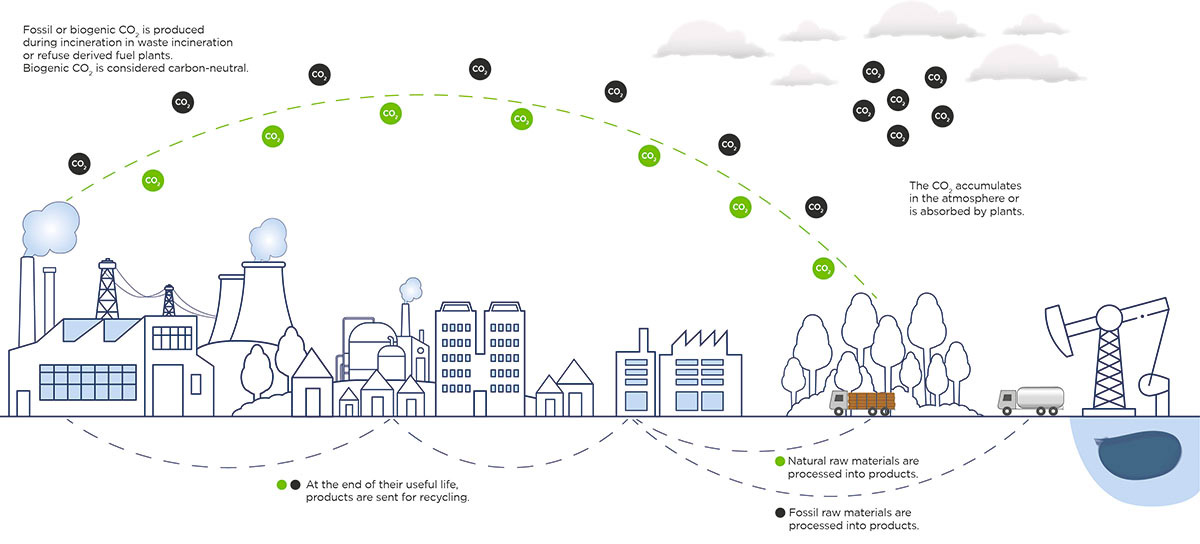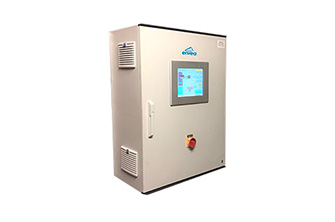Industries & markets
Measurement of biogenic CO2 emissions
Biogenic CO2 is playing an increasingly important role for operators of incineration and co-incineration plants. With the rising costs of emitted CO2 and the expansion of emissions trading, the determination of biogenic CO2 can reduce the costs for allowances and thus the costs of the plant. Additionally, plant operators might even profit from emissions trading systems.
What is biogenic CO2?
Carbon dioxide is released in a combustion process. If the CO2 emerges from burning recently naturally grown fuels such as plants, wood, paper, sewage sludge or animal meal, it is called biogenic CO2, because in the combustion process of biomass only as much CO2 is released as was bound from the atmosphere during growth. Emissions of biogenic CO2 are therefore also considered CO2 or climate neutral.

How can biogenic CO2 be determined?
Mixed fuels are used in particular in waste incineration plants or refuse derived fuel plants. A clear separation between biogenic and fossil fuels is not possible. Therefore, the climate-neutral CO2 must be determined in a process.
For this purpose, the 14C fraction can be determined on the emitted CO2. Fossil fuels do not have a 14C fraction. The ratio of carbon-14 to total CO2 emissions thus provides a highly precise statement on the proportion of biogenic CO2 in the flue gas of a plant. Other methods, which are often based on estimates and empirical values do not offer such accuracy. However, the more precise the determination, the better the opportunities to profit from biogenic CO2.
Cost savings with biogenic CO2 determination
The measurement of biogenic CO2 is interesting for all plant operators who burn fossil and organic fuels and who are currently or in the future obliged to participate in an emissions trading system. With a biogenic CO2 measurement the exact value of biogenic CO2 in tons/year can be determined. Since biogenic CO2 is classified as climate-neutral, no allowances from the EU ETS or local emissions trading systems would have to be purchased for this share of the emitted CO2. This means, when staying below the cap, allowances can be sold or kept for future usage, leading to a potential financial benefit.
Measurement of biogenic CO2 with permanent sampling
The permanent sampler AMESA-B from ENVEA continuously determines the biogenic CO2 fraction in the flue gas of a plant. This is done by means of volume-proportional extraction via a heated sampling probe. The CO2 is adsorbed in a cartridge filled with Ascarite or soda lime. The sampling time can range from several hours up to one month. Subsequently, a carbon-14 dating measurement is carried out in a laboratory to determine the exact share of biogenic CO2 in the total CO2 emissions of the plant. The AMESA-B permanent sampling system meets the requirements of DIN EN ISO 13833.
You would like to know more about the measurement of biogenic CO2? Send you non-binding inquiry now. Our experts get back to you shortly. Together, we are going to find the right solution for your biogenic CO2 measurement needs.
Talk to our experts
If you would like to learn more about the possibilities of determining biogenic CO2 in waste incineration or co-incineration plants, then use our contact form, write an email or call us. We look forward to talking to you.


